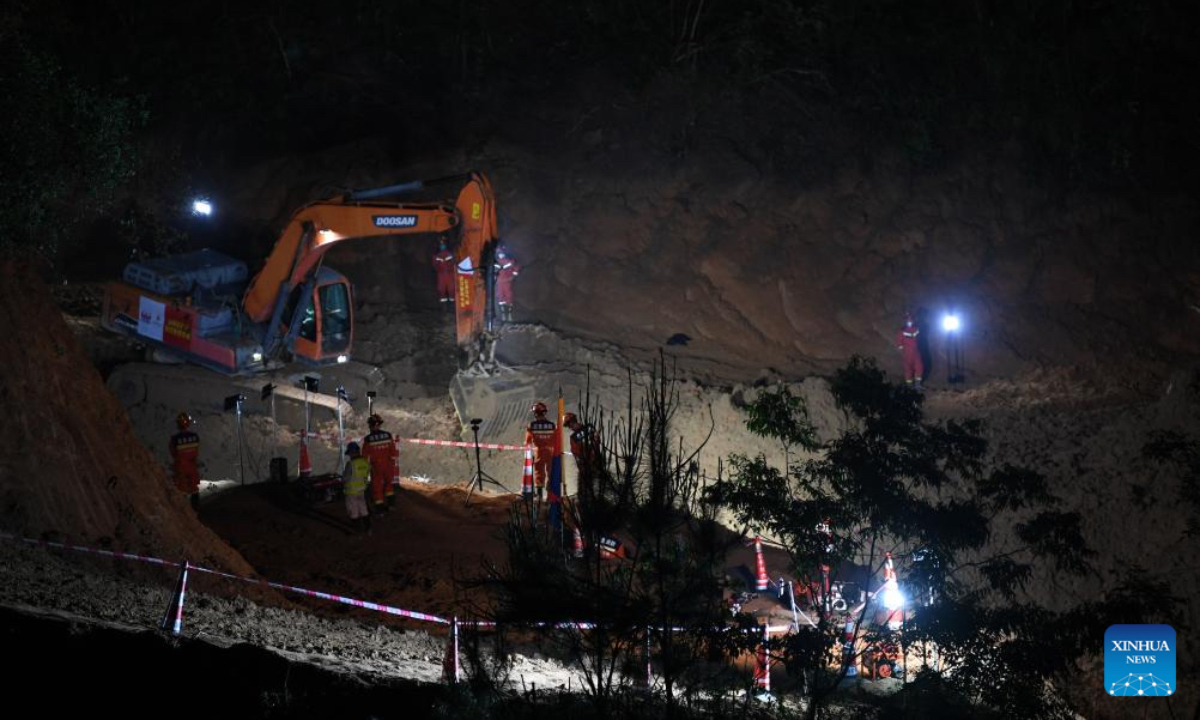Guangdong sets up team to investigate deadly May Day expressway collapse

Rescuers work at the site of an expressway collapse on the Meizhou-Dabu Expressway in Meizhou, south China's Guangdong Province, May 2, 2024. At about 2:10 a.m. on May 1, a landslide occurred in the Chayang section of the Meizhou-Dabu Expressway in Meizhou City, Guangdong Province. As of 3:30 p.m. on May 2, the disaster had caused 48 deaths and 30 injuries. (Photo: Xinhua)
South China's Guangdong Province has set up a disaster investigation and assessment team, headed by the provincial governor, to look into the deadly expressway collapse that took place on Wednesday in the province's Meizhou city, according to media reports on Sunday.
The cause of the disaster is still under investigation, according to local authorities.
As of press time, the death toll has risen to 48, after part of the Meizhou-Dabu Expressway collapsed around 2:10 am Wednesday, the Xinhua News Agency reported. The remains of three people have yet to be identified. Thirty others were injured, but none are in life-threatening condition.
On Sunday, a 15-year-old boy who was injured in the accident was discharged from Meizhou People's Hospital. He is the first injured person to be discharged, China Central Television (CCTV) reported Sunday.
The accident took place after heavy rainfall hit several parts of Guangdong for a few days, which eventually led to a landslide in the area. Aerial photos show one side of the expressway had caved in, causing vehicles to roll down the slope below.
Since April, Meizhou has experienced multiple heavy rain storms, with the city's average cumulative rainfall reaching 621.7 millimeters, 2.49 times more than the same period in a typical year, local authorities said during a news conference on Thursday. This surpasses the historical record for April rainfall since meteorological records began in 1980.
A local resident surnamed Mi told the Global Times on Sunday that this was the first time he had seen such intense rainfall during the May Day holidays in Meizhou. "Usually, similar heavy rainfalls do not occur until the end of May," he said, noting he thinks this may be the main cause behind the accident.
In this tragic accident, some spontaneous rescues at the scene also touched many people. One of those involved was Wang Xiangnan, a 33-year-old cold chain freight driver. When he discovered the accident ahead, he parked his 12.5-meter-long vehicle across the highway to prevent more cars from tumbling down the slope. Because of his brave actions, he was awarded 10,000 yuan ($1,413) from his company and another 10,000 yuan from a charity organization. During an interview, he said he would donate this reward to the families of the victims in the collapse, as they are in greater need of the money.
The rain in Meizhou has not ended yet. Strong convective weather is forecast to remain in Meizhou throughout the week, and traffic control will be implemented at potential danger points, local newspaper Meizhou Daily reported Sunday. The local authorities have activated a Level-IV flood control emergency response, the highest level.
The Department of Natural Resources of Guangdong Province said that in recent days, Guangdong has experienced historically rare and persistent heavy rainfall, severe convective weather, and high soil moisture content, which can easily lead to geological disasters such as landslides and road collapses. The geological disaster prevention situation is very severe.
The provincial department has conducted a "dragnet-style" investigation of geological disaster risks, focusing on areas near mountains, water, and villages, as well as areas prone to disasters such as mountainsides, cliffs, and slopes.
According to the China Meteorological Administration, starting from Sunday, the rainfall in South China will significantly weaken. However, Guangdong will still see cloudy and rainy weather on Monday and Tuesday. At the same time, the administration warns that although the rainfall is generally weakening, there is still great potential for secondary disasters like landslides, especially where the soil moisture content is high. Residents should try to avoid activities in geological disaster-prone areas such as mountains and river valleys.